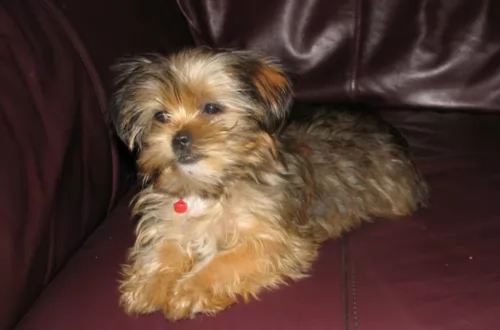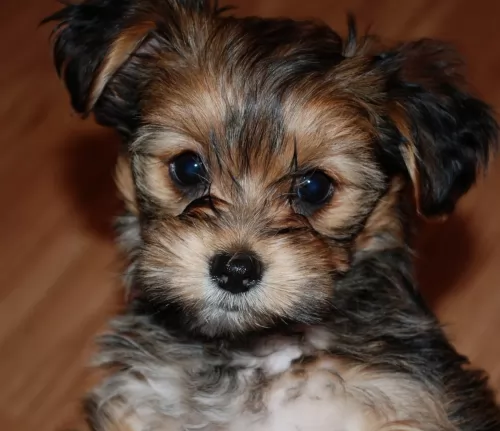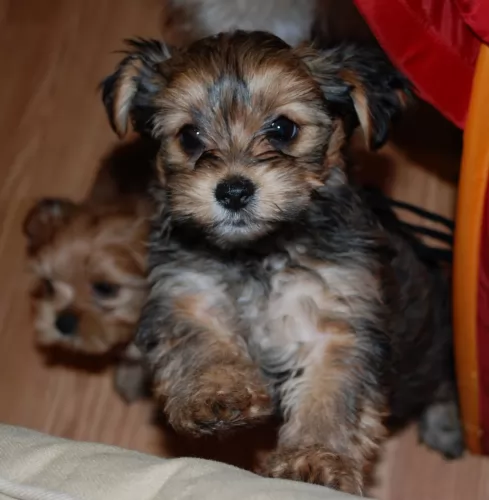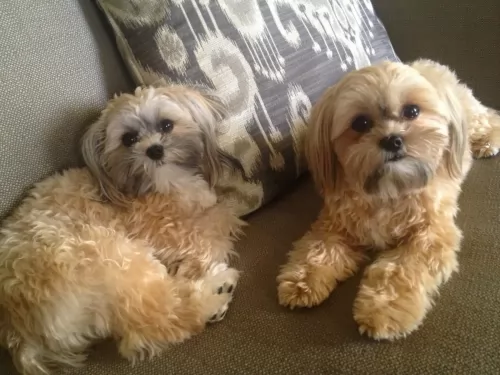 Petzlover
PetzloverShorkie is originated from United States but Talbot is originated from France. Shorkie may grow 45 cm / 17 inches shorter than Talbot. Shorkie may weigh 43 kg / 94 pounds lesser than Talbot. Shorkie may live 3 years more than Talbot. Shorkie may have less litter size than Talbot. Shorkie requires Moderate Maintenance. But Talbot requires Low Maintenance
 The Shorkie is a mix between a Yorkshire Terrier and a Shih Tzu. This little dog actually thinks he’s quite big. He is a great watchdog and a barker, and he is a loyal and loving member of his family. He will let you know if he thinks something is going on that shouldn’t be.
The Shorkie is a mix between a Yorkshire Terrier and a Shih Tzu. This little dog actually thinks he’s quite big. He is a great watchdog and a barker, and he is a loyal and loving member of his family. He will let you know if he thinks something is going on that shouldn’t be.
This hybrid combines two breeds known for their good looks, cuteness and personalities. Shorkies get their watchdog instincts and their loyalty to their people from the Shih Tzu and their personalities and good looks from the Yorkie. This designer breed has no known standard and every puppy is different, but traits from its founding breeds will remain. Both breeds have great personalities.
Regardless of the differences within the litter, because the personalities and adorableness of the two founding breeds are equal, all of the puppies will have those characteristics. They will all be energetic, playful and think they are big dogs. They will all love people and especially kids – playing and watching over them.
The Shorkie is intelligent, trainable, and snuggly. They will also have the stubborn trait that the two founding breeds can show at times. Developed in the United States, this crossbreed is extremely popular even though they have been in existence for only ten years or so. Breeders in the U.S. began to mix these two breeds in order to develop a cute, friendly and intelligent little dog that will cuddle on your lap – perfect lap dog.
Even if we already have breeds similar to the Shorkie, its development allows breeders to diversify and improve the genetics of the dogs. It is important that these be responsible breeders whose intentions are not financial but to legitimately improve the positive traits of each breed while sorting out the undesirable or weak traits. This is the positive side of the new designer breeds.
Even though it is still being developed, at least the Shorkie seems to be a success story for designer breeds as a loving, popular little dog. It will take a lot more time and a lot more development before the Shorkie becomes an actual recognized breed. At the moment it remains a hybrid, a crossbreed, a so called designer dog.
It will be at least 7-10 generations of careful and quality breeding before the Shorkies are potentially recognized as its own pedigree breed. It is important to breed Shorkies to Shorkies in order to develop a standard that could be accepted for a new breed by the AKC and UKC. Over time the puppies must become more and more standardized in their conformity to that new breed standard. Their physical appearance and their temperament will be standardized. At this stage the second generation of Shorkies is rare. Their popularity is rising in the United Kingdom. Both Britain and Ireland have a growing interest in this hybrid.
Known as the Talbot Hound, nobody really seems to have accurate records as to the origins of the Talbot dog breed but it seems to have originated in France.
It is believed that the Talbot, with his excellent nose, was a hunting dog, but he is now extinct.
It is thought that the dog descends from the beagle and the bloodhound. It came to England in 1066 and vanished towards the end of the 18th century.
 The Shorkie, being a cross between the Yorkshire Terrier and the Shih Tzu, and as such has physical and temperament characteristics from both breeds. They could be 50-50 but most likely each puppy will be more like one of the founding parents than the other. Because there is a lot of similarity between the founding breeds there is a lot of similarity between the Shorkies.
The Shorkie, being a cross between the Yorkshire Terrier and the Shih Tzu, and as such has physical and temperament characteristics from both breeds. They could be 50-50 but most likely each puppy will be more like one of the founding parents than the other. Because there is a lot of similarity between the founding breeds there is a lot of similarity between the Shorkies.
Their hair is either wavy or straight, but it is soft. It can be a wide variety of colors and usually they have a darker mask on the face. Usually they have the eyes of the Shih Tzu – large -but not protruding. Their muzzle is short, and the skull is round with triangle ears. Their bodies are compact, small with plenty of muscle for their size. They also have fine bones and short legs, with a thin curled tail.
The Talbot hound was a large, white purebred dog. He stood at roughly 58 to 69cm and weighed between 36 and 50kg.
He had a large head and a short, smooth, coarse pure white coat. He has a long tail which he held upright and fairly long floppy ears. He was a slow but efficient scenthound.
It is believed that this strong, hard working dog was gentle, loving and loyal and that he would have made an excellent family pet.
They were the kind of dogs that needed lots of social interaction with his human family. His amicable nature would have meant him getting on well with children and other dogs.
Slow, it’s a dog that had low intelligence and he may have taken a long time to learn any simple tricks or commands. If he were around today he wouldn’t have been suited to city living as he was a vocal breed – having quite a selection of barks and howls to voice his opinion.
The Talbot is extinct, but he was no doubt a docile, calm kind of dog that would have made a great family pet.
He would have been an ideal dog for first time dog owners too as he was a gentle, affectionate dog.They were tough, protective, stubborn but loving and loyal, and more’s the pity that this dog has disappeared.
 Many hybrids are in better health at least genetically than their parent breeds. Responsible breeders will breed any genetic issues out of their puppies. Still there are many health issues that the Shorkies are prone to. These include:
Many hybrids are in better health at least genetically than their parent breeds. Responsible breeders will breed any genetic issues out of their puppies. Still there are many health issues that the Shorkies are prone to. These include:
• Brachycephalic Airway Syndrome – “smashed face” causes problems with breathing, heat, flying and more.
• Glaucoma – Yorkshires have this, and it can be secondary to the lens Luxation.
Nobody can say what the health status of the Talbot dog was, but being a hunting dog, out in the open and getting plenty of exercise, he was no doubt a healthy dog. But all dogs can fall ill at some time or another with any one of the many dog illnesses there are -
Ear infections in dogs are quite common, but more so with dogs that have floppy ears.
You’ll see your pet scratching and pawing at his ears and shaking his head. There will in all likelihood be redness in your pets ears and you may even detect an abnormal odor.
There are quite a few things that can cause these ear infections in dogs such as ear mites, an excess of dirt and wax and bacteria.
Don’t allow your pet to suffer – get him to the vet. Your veterinarian will also show you how you can clean the ear for future times with a gentle cleanser. You have to be so careful not to rupture the ear drum, and some people prefer to get their vet to do this or professional groomers.
The Talbot could have suffered with ectropion – when the lower lids are turned out. Ectropion disrupts the function of the lower lid so that it can't protect the eye, and there is abrasion of the surface of the eye.
This condition can also bring on conjunctivitis. Get your pet to the vet for treatment and relief.
The lifespan of the Talbot was anything from 9 to 12 years of age, and one or two other health problems that could have shortened his life were dermatitis, cancer, hip dysplasia and eye infections.
 1.Feeding the puppy - The Shorkies need a high-quality, well-balanced dry kibble. Make sure it is a formula for small, active dogs. It should have lean meat and essential minerals and vitamins. Make sure it is puppy food not adult. The puppy needs 300 -550 calories a day in 3 meals.
1.Feeding the puppy - The Shorkies need a high-quality, well-balanced dry kibble. Make sure it is a formula for small, active dogs. It should have lean meat and essential minerals and vitamins. Make sure it is puppy food not adult. The puppy needs 300 -550 calories a day in 3 meals.
2.Feeding the adult – Obesity is a problem for the Shorkie as it is for many small dogs. Don’t overfeed your adult but give her the same kind of high quality small breed dog food, only for adults. They need about 200-300 calories a day in 2 meals.
4. Games and Exercises – These are very active little dogs and need exercise every day. They needs walks, games, and time with you. They also love to cuddle with you at the end of the day. They love squeaky toys and playing fetch outside or inside.
The Talbot with his short hair would have been looked upon as a low maintenance breed and would have required a brush now and again.
Because of the floppy ears, they would have needed to be checked inside for infection.
The Talbot was a strong, hard-working kind of dog so if commercially manufactured dog food was available in that time, you would have ensured a good quality one for strong, energetic dogs.
At that time, Talbot dog owners tossed their dogs bits of raw meat. Home-made food like boiled chicken, brown rice, spinach, carrots and sweet potatoes without any exotic flavorings would have been an excellent diet.